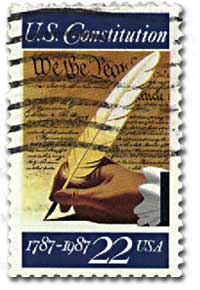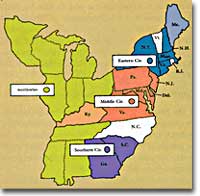16e. The Antifederalists' Victory in Defeat

1987 marked the 200th anniversary of the U.S. Constitution.
With the narrow approval of the Constitution in Virginia and New York, in June and July 1788, respectively, the Federalists seemed to have won an all-out victory. The relatively small states of North Carolina and Rhode Island would hold out longer, but with 11 states ratifying and all the populous ones among them, the Federalists had successfully waged a remarkable political campaign of enormous significance and sweeping change.
The ratification process included ugly political manipulation as well as brilliant developments in political thought. For the first time, the people of a nation freely considered and approved their form of government. It was also the first time that people in the United States acted on a truly national issue. Although still deciding the issue state-by-state, everyone was aware that ratification was part of a larger process where the whole nation decided upon the same issue. In this way, the ratification process itself helped to create a national political community built upon and infusing loyalty to distinct states. The development of an American national identity was spurred on and closely linked to the Constitution.

This maps shows how the U.S. in 1789 was divided into 4 federal court districts. Take note that Rhode Island and North Carolina had not ratified the Constitution and weren't part of the districting.
The Federalists' efforts and goals were built upon expanding this national commitment and awareness. But the Antifederalists even in defeat contributed enormously to the type of national government created through ratification. Their key objection challenged the purpose of a central government that didn't include specific provisions protecting individual rights and liberties. Since the new national government was even more powerful and even more distant from the people, why didn't it offer the kinds of individual protections in law that most state constitutions had come to include by 1776?
To the Antifederalists, the separation of powers was far too mild a curb against the threat of government tyranny. As a result states beginning with Massachusetts ratified the Constitution, but called for further protections to be taken up by the new Congress as soon as it met. This loomed on the unresolved political agenda of the national Congress and the adoption of the Bill of Rights (the first ten amendments to the Constitution) is a legacy of the victory-in-defeat of Antifederalists. Their continued participation in the political process even when they seemed to have lost on the more general issue had immense importance.
The Constitution was created out of a tough-minded political process that demanded hard work, disagreement, compromise, and conflict. Out of that struggle the modern American nation took shape and would continue to be modified.






